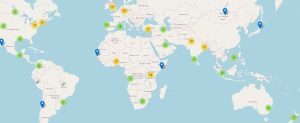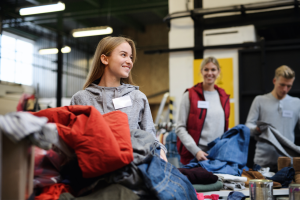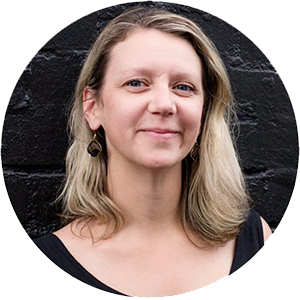Students: Today’s visionaries, tomorrow’s everything
Today’s students are the future: our future workforce, future voters, future producers and consumers, future urban planners, future educators, future farmers, future parents, future problem inheritors, future problem solvers – future everything.
They are today’s visionaries and tomorrow’s everything. The decisions they make, the realities they choose, the truths they agree on can potentially be everyone’s reality – depending on how widely their ideas and visions are agreed upon and adopted, of course.
But young people have always been the future, so what’s different?
Globally, we are moving towards more of an understanding in society and education that students need to be fully active in their learning for it to be meaningful, useful, and transformational. Due to this we are seeing an increased use of terms to describe students: future shapers, future benders, future creators, and future designers.
At the same time, students are increasingly aware of their potential as active participants in society, both now and in our shared collective unknown futures.
The future is not fixed. It has multiple potentials.
The future is yet to be determined. Will we have an ecological collapse? A world ridden by climate disasters with mass displacement of refugees? A world where big corporations and social media companies control us through our own data?
Or a world where humans live in sustainable harmony with the planet and each other, with regenerative thinking and approaches at the heart of all we do? Futures thinking explores all the possibilities of our collective futures, but acknowledges that nothing is fixed or certain.
Which future will be the one we choose and what will it take to get there?
An education system designed for Student Agency
To do this young people must have experienced an education system that has empowered them to be able to take action where they see need. They need to understand who they are, equipped with the knowledge and skills to navigate a complex and changeable world. They need an education that provides authentic intercultural learning for their globalised futures and a strong foundation of Social Emotional Learning, empowering them to lead inclusively where they see a need. Our future worlds demand empathy, compassion and kindness for all. We all need to see diversity as a strength and inclusion not as something to aspire to, but something that is a fundamental right that should always be present so that to ‘include’ others is inherent because everyone already belongs.
They need media literacy and digital citizenship skills to avoid the pitfalls of murky online worlds and to leverage these powerful tools ‘for good’. Media bombardment and smartphones in most high school (and some primary school) students’ pockets mean they have access to worldwide news and events around the clock – and they have done so their whole lives. They see in real-time global and local events; floods, war, animal habitat destruction, refugees, racism and the idea of all these things intersecting, aptly named the Polycrisis.
We have a generation of children with climate anxiety and climate grief.
We also have a generation of children determined to try and turn the Climate Emergency around.

Map of Fridays for Futures Global Strikes and Actions
I used to think the top environmental problems were biodiversity loss, ecosystem collapse, and climate change. I thought that with thirty years of good science we could address those problems. But I was wrong. The top environmental problems are selfishness, greed and apathy.
Young people must know how to take action on issues of concern, on issues they feel passionate about – be active and involved community members, with the ability to look outwards, globally, but grounded in their own realities and communities locally.
We must ensure they never feel helpless.
What do young people want from their education?
Unfortunately many young people say that they aren’t receiving this kind of education.
In 2021 Transcend, a US Education company, interviewed 20,000 young people across the country, publishing a paper on their findings, Conversations with Kids.
Findings included:
- Most young people say their experiences in school feel irrelevant and offer few opportunities for agency and choice.
- Many young people report that their best experiences in school happen outside of core academics – and these experiences are inequitably distributed.
- Many young people of all backgrounds are thinking about, talking about and taking action to address social inequities – sometimes more than adults realise.
And it’s not just young Americans that feel like this.
The WISE Global Education Barometer surveyed 16-25 year olds in 20 countries in 2020. Several consistent trends emerged including:
- Young people believe their generation has a responsibility to better the planet (87% of participants), yet less than half feel ready to understand the big societal issues (48%) and take action and find solutions to these problems (43%).
- Young people trust the education system and their teachers in their ability to provide them with useful skills and knowledge. However, they also expect more diversity in their learning experiences and they would like schooling to give more space to new technologies and creativity, curiosity, or collaboration.
Education policymakers should ask themselves “will those in any and all kinds of employment after they finish compulsory schooling reflect on their education and think it was meaningful.
The beautiful risk of education innovation. Crystal Green, Lasse Leponiemi
Designing education for Student Action
This is why many educators see civic engagement and education as so essential. Young people must understand not only their rights in society but also their responsibilities – and be willing to exercise both:
- Through civil action, e.g. petitions, protests, lobbying.
- Through civic action, e.g. volunteering.
- Through creating or joining supporting systems and networks to address issues of concern. e.g. student clubs, community groups.
- Through inventing, solving and creating. e.g. building an actual scientific solution to an issue.
- Through redesigning social or physical systems e.g. green spaces in their school.
- A combination of these things or any other action, large or small, that aims to improve their community in some way.

Despite hearing the well-justified cry that the education system is outdated or broken as a whole, there are amazing schools and educators already doing this work. There are pedagogies schools have universally adopted that support students at the centre of their learning, directing their learning in real world contexts. These pedagogies have been around for decades. Two decades ago in my own teacher training in New Zealand we learnt about Inquiry Based Learning through ‘project work’ framed by inquiry questions.
Ultimately, it comes down to choices about learning design, about the opportunities (through curriculum or clubs) to provide students with real-world learning, to take action on issues they see they can make a difference in. The commitment to support the young people, to provide not only the opportunities to design solutions to real-world problems, to provide opportunities to learn and develop the skills needed to do so; Leadership, Design Thinking, Creativity, Critical Thinking, Media Literacy, Digital Citizenship, to name a few.
Educators need space to create these real-life opportunities in their classrooms and schools and the confidence of school leadership and, more broadly, education systems, to do so.
They may also need PD in the different aspects of Changemaker Education, but they also need the time and space to share their own learnings in these areas with their colleagues.
… learners should have actual experiences and opportunities to develop, test and build their own views, values and attitudes, and to learn how to take actions responsibly for the socio-emotional and behavioural dimensions… This type of learning requires teachers to guide, facilitate and encourage their students on a journey of critical thinking, inquiry and self discovery about the world around them.
Preparing Teachers for Global Citizenship Education. A Template. UNESCO Bangkok Office 2018
The rallying cry is there, education must change to be truly student-centred, designed for meaningful student agency. Our young people’s futures depend on it, the planet depends on it, and our unborn future generations depend on it.
Let’s empower our young people to be the problem-solving leaders we so desperately need, for both today and the future.
Support Student Action and Agency today!
Meg Languages is committed to supporting educators and school leaders design meaningful Student Action projects:
- Applications for Meg’s one year Global Citizenship Student Ambassador Programs, Australasia and Global cohorts are now open. Limited funded places are available in the State of Victoria.
- Young Changemaker Education self paced, online PD course – free until the end of 2023
- Introduction to Changemaker Education, live PD sessions in global time zones

Lottie Dowling is the Manager of Going Global at Meg. Lottie has worked for over twenty years in education as a school practitioner and professional learning leader on global, national and regional levels and has worked in six countries around the globe, including a decade in China. As a leader in professional learning she has run networks of schools with educators working on pedagogical change and school improvement, facilitated educators development of global learning, global competency and intercultural understanding both nationally and internationally. She speaks Chinese and has a strong interest in Languages education. She feels passionately about the way education shapes society and believes we all can truly engage the next generation to achieve their maximum potential through it. She can be found at @LottieDowlingNZ.

